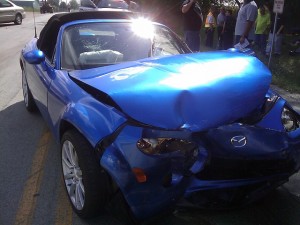 Imagine this: you’re driving down the street after a long day at work. It’s getting dark and as you make your way across the intersection, you see the unmistakable flash of light from a car’s head beams. You know it’s your turn to cross the road so you don’t mind it, but a few seconds later, you feel pain as something crashes into your car with such speed that it knocks you out.
Imagine this: you’re driving down the street after a long day at work. It’s getting dark and as you make your way across the intersection, you see the unmistakable flash of light from a car’s head beams. You know it’s your turn to cross the road so you don’t mind it, but a few seconds later, you feel pain as something crashes into your car with such speed that it knocks you out.
But, it isn’t over. You’re alive, but winded, and as you manage to scramble to your feet and out of your car, the air erupts in horrified screams and the sound of a car zooming towards the distance. You’ve just been hit-and-run. What should you do?
The Scene of the Crime
ChristensenYoungLaw.com and other car accident injury attorneys note that the first thing you should do once you see realize the culprit has sped off is to gather evidence. By the time you get up, the witnesses will most likely have already contacted the police and an ambulance, so you should be ready to provide them with as much information to find who is responsible.
Your memory may be a bit hazy, but anything you remember about the car that hit you is solid evidence. This includes their license plate (even if it’s just part of it), the car’s make and model, and color. If you managed to see who the driver was, describe them the best you can. Even if it’s a generalized image, it can go a long way to find the culprit. You might want to gather information from the witnesses as well. More often than not, they would have a clearer look of the accident and may be able to provide more information to the police than you.
Finally, it’s a good idea to take a picture of the damage to your car and the crime scene in general. This will come in handy when you file for insurance later on since many need solid proof on top of a police report that you were the victim of a hit and run.
Pursuit of justice
Unfortunately, the chances of you finding out who crashed into your car and left you for dead are slim. Even if the police find out their license plate number, tracking them down can prove difficult since the culprit will most likely be hiding or on the run.
If you’re not satisfied with what your insurance company gives you as compensation and you really want to track the culprit, then it’s imperative that you get an attorney. They have a more comprehensive way of gathering information to track down the runaway driver.
The harsh reality is that not all hit-and-run accidents end with the driver getting caught. It’s a hard truth, especially since the criminal may be just as cunning in covering their trail and disposing of any evidence that would link them to their crime. Despite this, getting legal help is still the best way to handle a hit-and-run as even if you don’t find out the culprit, you’ll be able to maximize your insurance claims.
